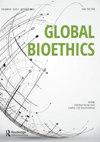The relation between law, religion, culture and medical ethics in Nigeria
Q1 Arts and Humanities
引用次数: 5
Abstract
Nigeria consists of over 250 ethnic groups with various customs and values. There are three dominant religions: Christianity, Islam and sundry traditional religions. The religion and cultures of the various peoples control the lives and transactions of the various groups. Nigerian law is based on English common law, customary law and Islam-based Sharia law. Medical ethics came into focus in the early 1960s after independence, when the Medical and Dental Council of Nigeria (MDCN) was set up to regulate the practice of medicine and dentistry. The law that established the Medical and Dental Council was updated in 1990, under the Medical and Dental Practitioners Act, Cap 221, laws of the Federal Republic of Nigeria. Medical ethics in Nigeria is based on the core principles of the Hippocratic oath, and the Nigerian code of medical ethics was revised in 1990 and 2004. However, the core principles remain the same. The law, religion and culture of the Nigerian people seem to be in firm accord with the code of medical ethics as it relates to abortion and euthanasia. The Nigerian penal code regards euthanasia as murder. Abortion, except done in order to save the life of the mother, remains a criminal offence. However, litigations against those who commit abortion are few and far between. This harmony between law, religion, culture and medical ethics, however, does not apply to the medical practices of organ transplantation, assisted conception and its related practices, and limb amputations. This paper discusses in detail the polemics and discordant dynamics of the emerging ethical controversies and proffers suggestions for a way forward, in order to obviate possible ethical conundrums.尼日利亚法律、宗教、文化和医德之间的关系
尼日利亚由250多个具有不同习俗和价值观的民族组成。主要有三大宗教:基督教、伊斯兰教和各种传统宗教。不同民族的宗教和文化控制着不同群体的生活和交易。尼日利亚法律以英国普通法、习惯法和伊斯兰教法为基础。在尼日利亚独立后的20世纪60年代初,医学伦理成为人们关注的焦点,当时成立了尼日利亚医学和牙科理事会(MDCN),以规范医学和牙科的实践。根据尼日利亚联邦共和国法律第221章《医疗和牙科从业人员法》,1990年更新了设立医疗和牙科委员会的法律。尼日利亚的医学伦理以希波克拉底誓言的核心原则为基础,尼日利亚的医学伦理守则于1990年和2004年进行了修订。然而,核心原则保持不变。尼日利亚人民的法律、宗教和文化似乎与与堕胎和安乐死有关的医学道德守则完全一致。尼日利亚刑法将安乐死视为谋杀。堕胎,除非是为了挽救母亲的生命,仍然是一种刑事犯罪。然而,针对堕胎者的诉讼却少之又少。然而,法律、宗教、文化和医学伦理之间的这种和谐并不适用于器官移植、辅助受孕及其相关做法和截肢等医疗实践。本文详细讨论了新出现的伦理争议的争论和不和谐的动态,并为未来的道路提供了建议,以避免可能的伦理难题。
本文章由计算机程序翻译,如有差异,请以英文原文为准。
求助全文
约1分钟内获得全文
求助全文

 求助内容:
求助内容: 应助结果提醒方式:
应助结果提醒方式:


